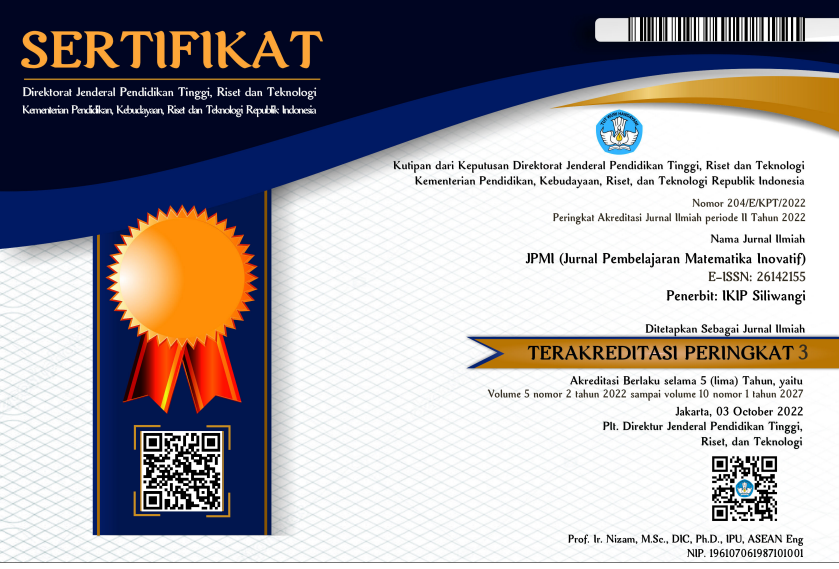PENERAPAN STEM PROBLEM BASED LEARNING UNTUK MENINGKATKAN KEMAMPUAN BERPIKIR KRITIS MELALUI LESSON STUDY
DOI:
https://doi.org/10.22460/jpmi.v6i3.17345Keywords:
Critical Thinking, Problem Based Learning, STEMAbstract
References
Abu-Alghayth, K., Jones, P., Pace-Phillips, D., & Meyers, R. (2020). Through the looking glass: lesson study in a center school. International Journal of Educational Methodology, 6(2), 423–433. https://doi.org/10.12973/ijem.6.2.423
Ancar, L. N., Freeman, S. A., & Field, D. W. (2007). Professional connections through the technology learning community. The Journal of Technology Studies, 33(2), 73–78. https://doi.org/10.21061/jots.v33i2.a.2
Arivina, A. N., & Jailani, J. (2020). Development of trigonometry learning kit with a stem approach to improve problem solving skills and learning achievement. Jurnal Riset Pendidikan Matematika, 7(2), 178–194. https://doi.org/10.21831/jrpm.v7i2.35063
Balan, L., Yuen, T., & Mehrtash, M. (2019). Problem-based learning strategy for cad software using free-choice and open-ended group projects. Procedia Manufacturing, 32, 339–347. https://doi.org/10.1016/j.promfg.2019.02.223
Celik, A. O., & Guzel, E. B. (2020). How to improve a mathematics teacher ’ s ways of triggering and considering divergent thoughts through lesson study. International Electronic Journal of Mathematics Education, 15(3), 1-14. https://doi.org/10.29333/iejme/8461
Chen, C. H., & Yang, Y. (2019). Revisiting the effects of project based learning on students’ academicachievement: a meta-analysis investigating moderators. Educational Research Review, 26(1), 71–81.
Effendi, A., & Fatimah, A., T. (2019). Implementasi model pembelajaran creative problem solving untuk siswa kelas awal sekolah menengah kejuruan. Jurnal Teorema :Teori Dan Riset Matematika. Jurnal Teorema :Teori Dan Riset Matematika, 4(2), 89–98. https://doi.org/http://dx.doi.org/10.25157/teorema.v4i2.2535
Hendriana, H., Rohaeti, E., & Sumarmo, U. (2017). (2. Hard skills dan soft skills matematik siswa. Jakarta : Refika Aditama.
Hsieh, H., Lou, S., Shih, R., & Economics, H. (2013). Applying blended learning with creative project-based learning : a case study of wrapping design course for vocational high school students. The Online Journal of Science and Technology, 3(2), 18–27.
Kizkapan, O., & Bektas, O. (2017). The effect of project based learning on seventh grade students’ academic achievement. International Journal of Instruction, 10(1), 37–54. https://doi.org/10.12973/iji.2017.1013a
Kula Ünver, S., & Bukova Güzel, E. (2016). Conceptualizing pre-service mathematics teachers’ responding to students’ ideas while teaching limit concept. 2(12), 33–57. https://doi.org/10.5281/zenodo.193076
Lee, H. C., & Blanchard, M. R. (2019). Why teach with PBL? Motivational factors underlying middle and high school teachers’ use of problem-based learning. Interdisciplinary Journal of Problem-Based Learning, 13(1), 1–15. https://doi.org/10.7771/1541-5015.1719
Lestari, D., Ansori, I., & Karyadi, B.(2017). Penerapan Model pbm untuk meningkatkan kinerja dan kemampuan berpikir kritis Pendahuluan. Jurnal Pendidikan Dan Pembelajaran Biologi, 1(1), 46–54.
Merritt, J., Lee, M. Y., Rillero, P., & Kinach, B. M. (2017). Problem-based learning in K-8 mathematics and science education: A literature review. Interdisciplinary Journal of Problem-Based Learning, 11(2), 5–17. https://doi.org/10.7771/1541-5015.1674
Nita, R., & Irwandi, I. (2021). . Peningkatan kemampuan berpikir kreatif siswa melalui model project based learning (PjBL) *Improving Students’ Creative Thinking Ability through Project Based Learning (PjBL) Models. Bioedusains: Jurnal Pendidikan Biologi Dan Sains, 4(2), 231–238.
Nunaki, J. H., Damopolii, I., Kandowangko, N. Y., & Nusantari, E. (2019). The effectiveness of inquiry-based learning to train the students’ metacognitive skills based on gender differences. International Journal of Instruction, 12(2), 505–516. https://doi.org/10.29333/iji.2019.12232a
Nuraini, Waluyo, E. (2021). Development of instructional design project-based learning model integrated science process skills to improve science literacy. Jurnal Pendidikan Sains, 9(1), 104–112.
OECD. (2019). PISA 2018 results. what students know and can do. Paris : OECD Publishing.
Ririn, P., Wiyanarti, E., & Kurniawati, Y. (2021). The analysis of students’ creative thinking skills through the implementation of the project based learning model in social studies learning. International Journal Pedagogy Of Social Studie, 6(2), 9–18.
Sairo, M. I. (2021). Pelaksanaan lesson study menggunakan metode pembelajaran mind mapping di kelas X MIPA 3. Journal for Lesson and Learning Studies, 4(1), 26–32. https://doi.org/10.23887/jlls.v4i1.32188
Santika, I., Parwati, N., & Divayana, D. (2020). Pengaruh model pembelajaran berbasis masalah dalam setting pembelajaran daring terhadap prestasi belajar matematika dan kemampuan pemecahan masalah siswa kelas X SMA. Jurnal Teknologi Pembelajaran Indonesia, 10(1), 105–117.
Sasson, I., & Malkinson, N. (2018). Fostering the skills of critical thinking and question-posing in a project-based learning environment. Thinking Skills and Creativity, 29(1), 203–212.
Shernoff, D. J., Sinha, S., Bressler, D. M., & Ginsburg, L. (2017). Assessing teacher education and professional development needs for the implementation of integrated approaches to STEM education. International Journal of STEM Education, 4(1), 1–16. https://doi.org/10.1186/s40594-017-0068-1
Widias, N., & Lukman, H. (2022). Rancangan desain pembelajaran science, technology, enggineering and mathematic untuk meningkatkan kemampuan pemecahan masalah matematis siswa. Griya Journal of Mathematics Education and Application, 2(4), 1117–1128. https://doi.org/10.29303/griya.v2i4.231
Wijnen, M., Loyens, M., Wijnia, L., Smeets, G., Kroeze, M. J., & Van der Molen, T. (2018). Is problem-based learning associated with students’ motivation? A quantitative and qualitative study. Learning Environments Research, 21(2), 173–193. https://doi.org/10.1007/s10984-017-9246-9
Wolthuis, F., & Hubers, D. (2020). Between lethal and local adaptation : Lesson study as an organizational routine. International Journal of Educational Research, 100, (101534), 1–12. https://doi.org/10.1016/j.ijer.2020.101534
Yahdi, Y., Hajaroh, S., & Marhamah, I. (2020). Pengaruh model pembelajaran problem based learning terhadap keterampilan berpikir kritis. Spin Jurnal Kimia & Pendidikan Kimia, 2(1), 68–82. https://doi.org/10.20414/spin.v2i1.2012
Yamin, Y., Permanasari, A., Redjeki, S., & Sopandi, W. (2020). Implementing project-based learning to enhance creative thinking skills on water pollution topic. JPBI (Jurnal Pendidikan Biologi Indonesia), 6(2), 225–232. https://doi.org/10.22219/jpbi.v6i2.12202
Zakiyah, H., & Ulfa, N. (2018). Pengaruh model pembelajaran pbl (problem based learning) terhadap hasil belajar siswa pada materi bahan kimia dalam kehidupan sehari-hari. Lantanida Journal, 5(2), 106-118. https://doi.org/10.22373/lj.v5i2.2833

















